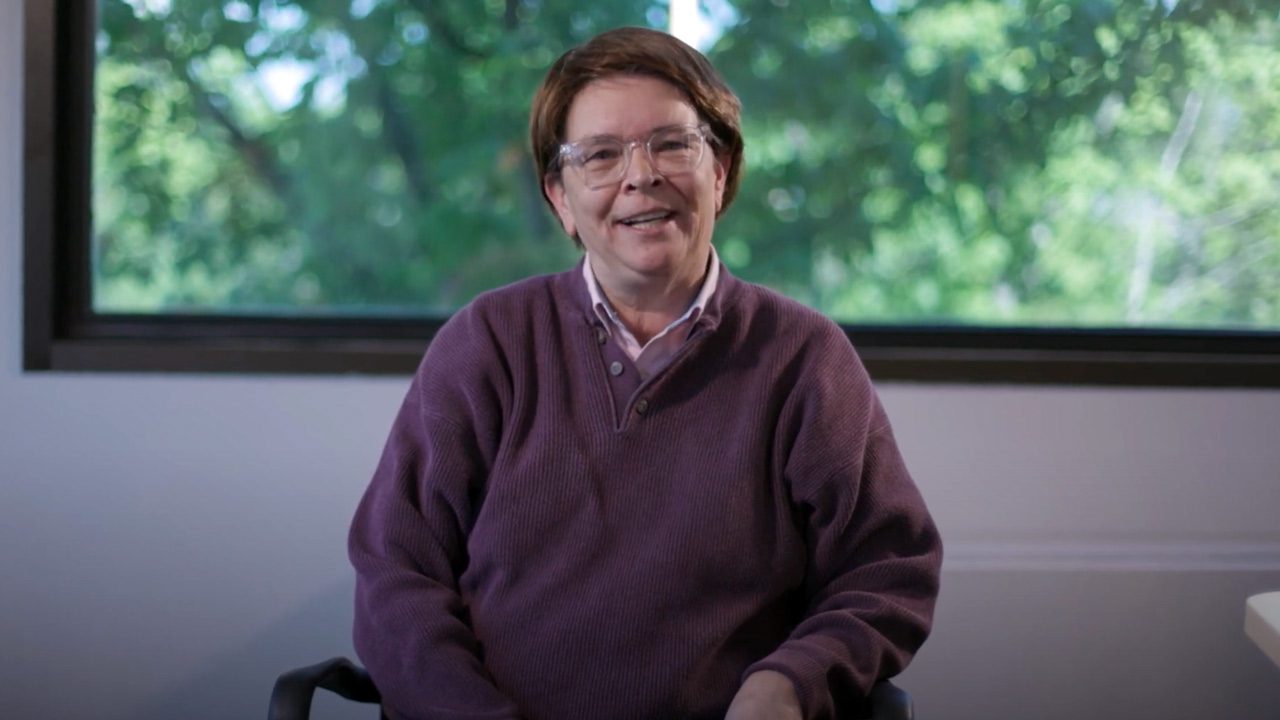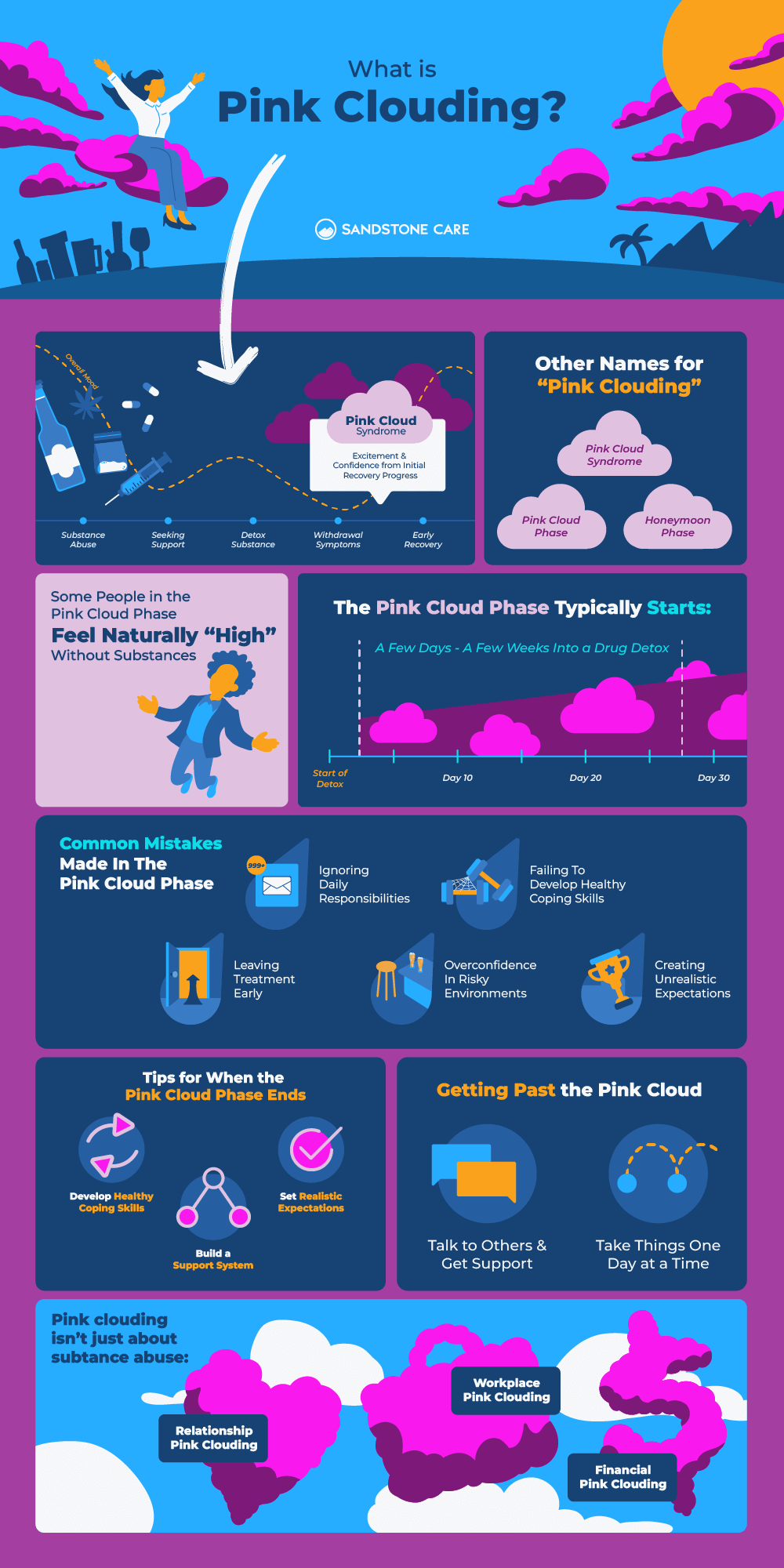Pink Cloud Meaning
What Is Pink Clouding?
Pink clouding, also known as pink cloud syndrome, is a period in early addiction recovery where a person feels exhilarated or euphoric.
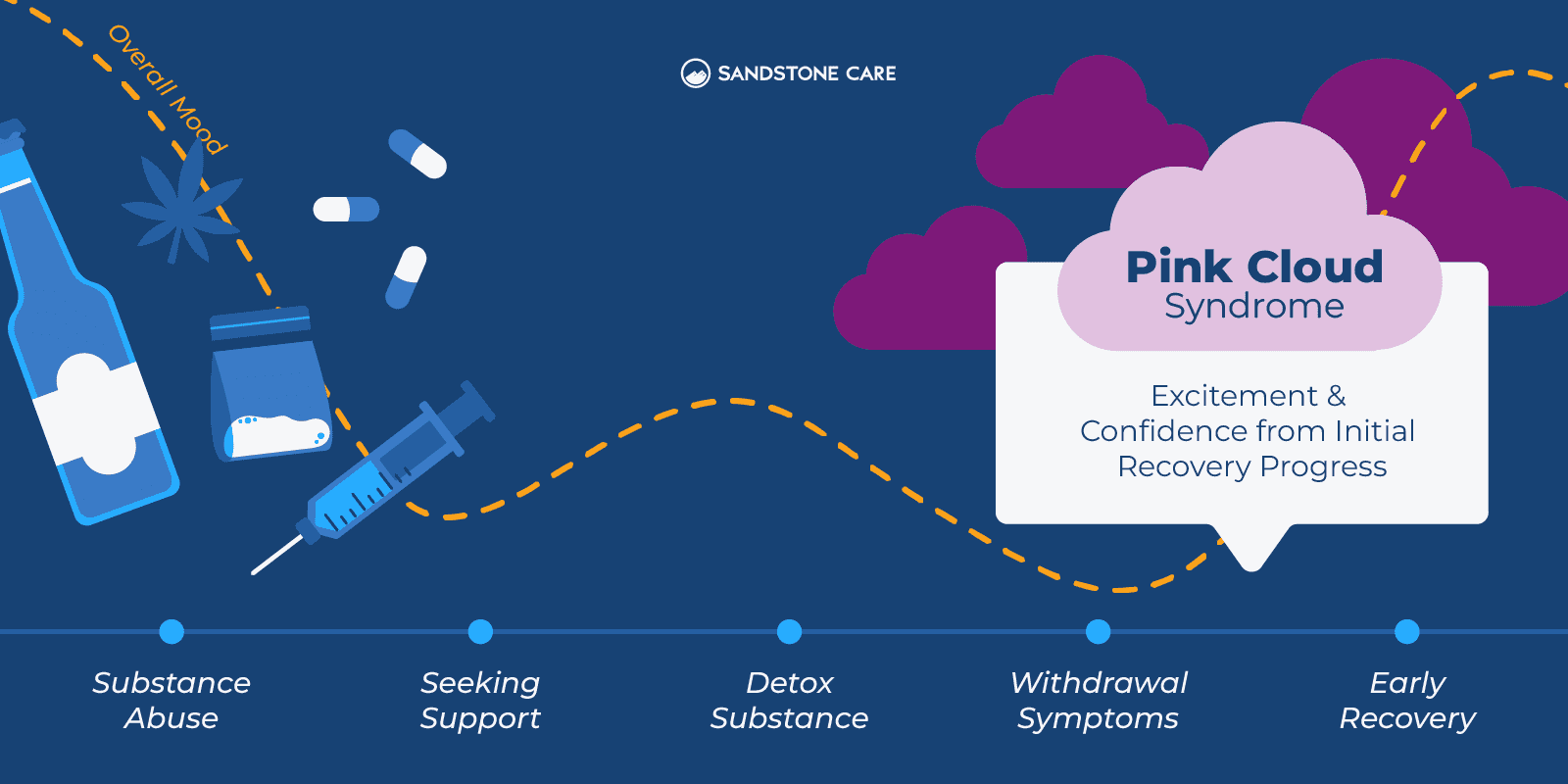
In the pink cloud phase, a person is often coming out of the withdrawal stage or is newly sober, and they feel excited and confident about their recovery.
Unfortunately, sometimes pink clouding can result in unrealistic expectations that lead to feelings of shame or guilt if the person relapses.
Where Does the Term Pink Cloud Come From?
The term “pink cloud” has roots in Alcoholics Anonymous.
When you think of pink clouds, you might think about looking up at a beautiful sky, feeling happiness, and forgetting about the world around you.
This feeling of happiness and detachment from the world may come when a person is in the early stages of recovery and new to sobriety.
While feeling better and becoming sober is an amazing thing, the pink cloud stage can impact a person’s recovery and is something to be aware of.
Pink clouding is also referred to as pink cloud syndrome, the honeymoon phase, or the pink cloud phase.
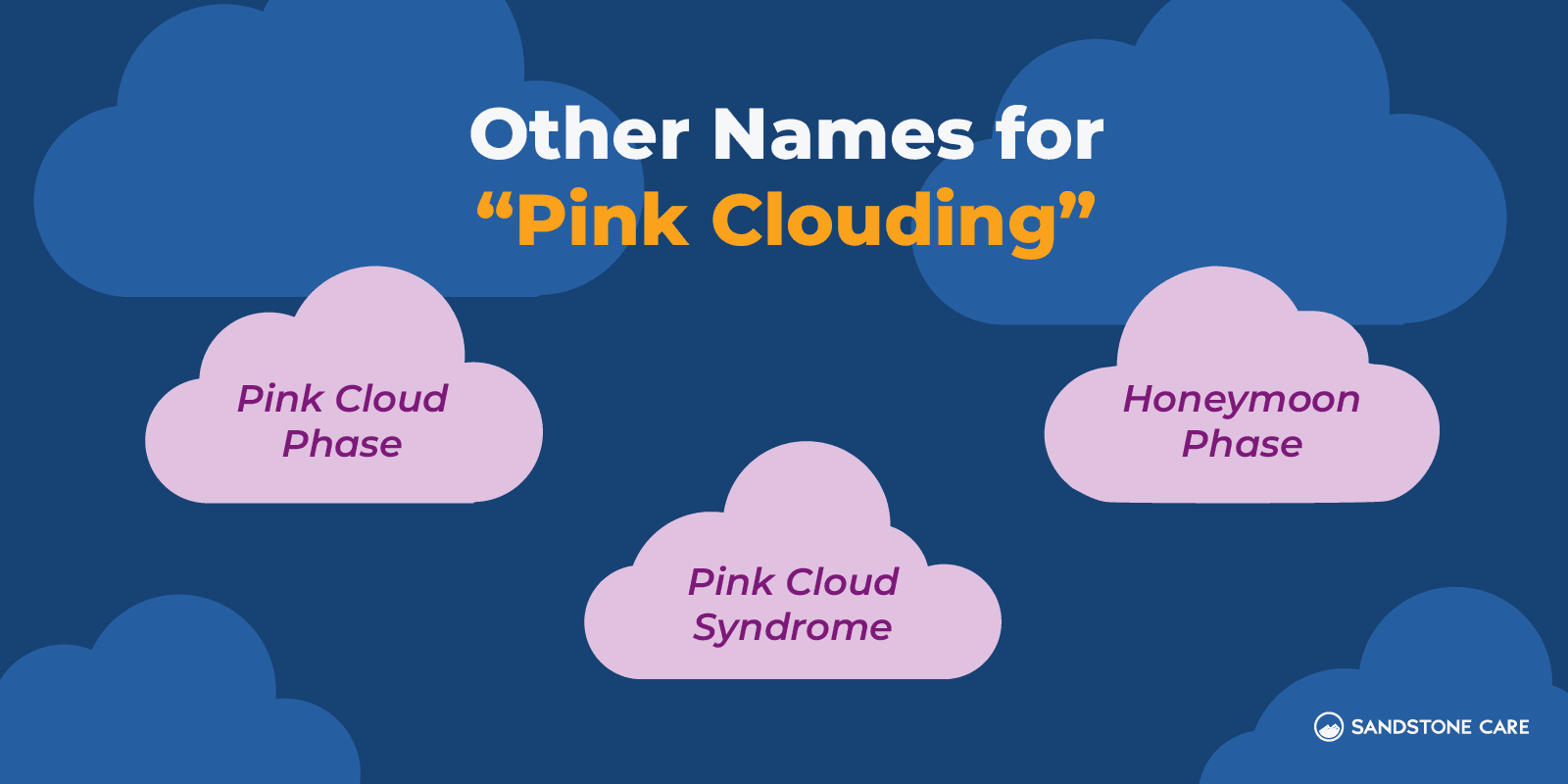
Pink Cloud Syndrome Signs
What Causes Pink Cloud Syndrome
When a person has been engaging in substance or alcohol use over a long period, their brains and bodies can become used to constant imbalances and a different state of mind.
They might become detached from reality or unrecognizable, even to themselves.
When a person is in the pink cloud stage, they might feel naturally “high” because their body and brain are finally returning to a balanced level, making them feel a euphoria similar to the one they would temporarily feel when they were high from a substance.
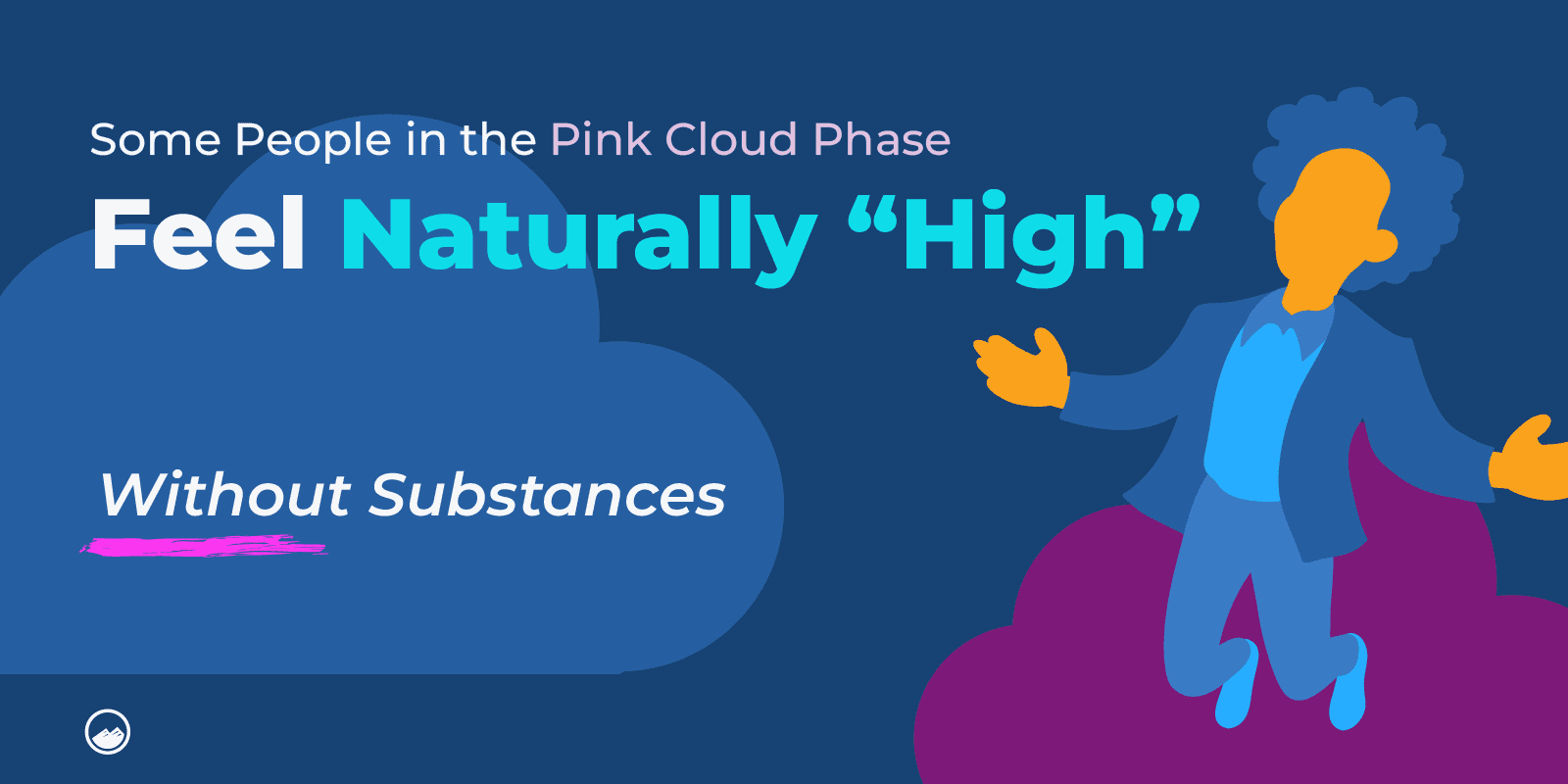
What Does the Pink Cloud Feel Like?
Pink clouding often involves feelings of:
- Hopefulness
- Optimism
- Euphoria
- Happiness
- Joy
- Exhilaration
- Excitement
What Are Pink Cloud Symptoms?
Some of the most common pink cloud symptoms include:
- Elevated mood
- Feelings of euphoria and joy
- Optimism about recovery
- Withdrawal from support systems
- Unrealistic expectations
Stages of Pink Clouding
When Does Pink Cloud Start?
Pink clouding often starts a few days after a person has completed detox.
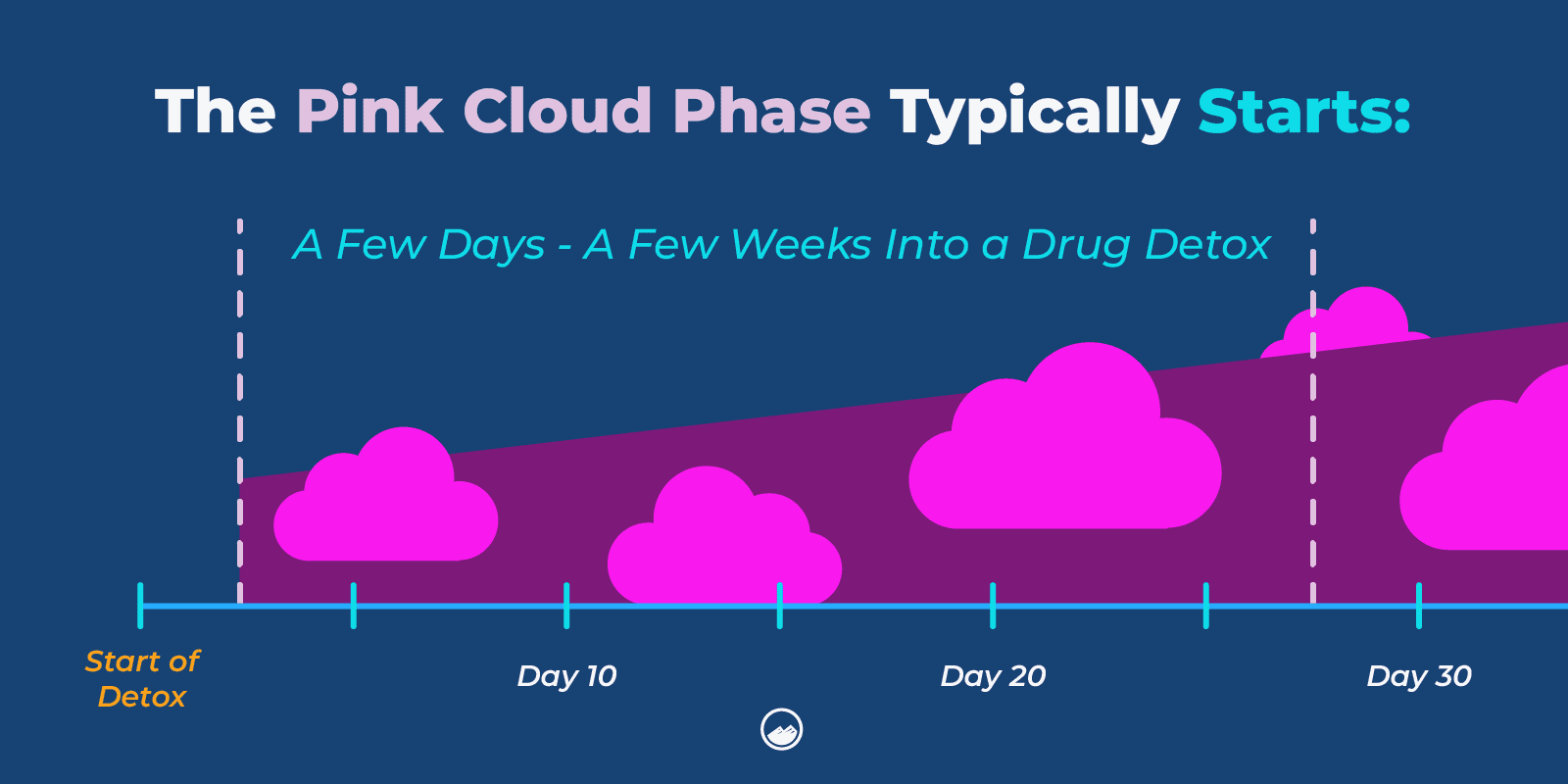
Others may experience pink cloud syndrome a few weeks after completing detox.
The drug and alcohol withdrawal stage can be very uncomfortable and difficult to get through. Once a person gets through this difficult stage of recovery, they may find more clarity and peace as their body is rid of the substances.
That clarity and peace may give way to extreme joy that is difficult to maintain after the first early days of recovery.
How Long Does Pink Cloud Last?
Pink clouding can be different from person to person.
For some, it may last a few days. For others, it can last a few weeks or even a few months.
The pink cloud does not last forever, and usually wears off when the person starts getting back to their “normal life” for the first time.
What Comes After the Pink Cloud in Recovery?
When a person is in the pink cloud stage, they experience feelings of euphoria and confidence about recovery, but after this stage passes, they often experience an emotional crash.
After pink cloud, recovery can feel overwhelming and a person can become anxious and even disappointed. Getting back to normal life can feel difficult and recovery might not seem as it was when you were in the pink cloud stage.
The pink cloud stage will come to an end, and managing daily stressors or difficult events can feel very discouraging and make it hard to keep up on the recovery journey. It can also cause a resurgence of mental health issues as overconfidence collapses into frustration and exhaustion.
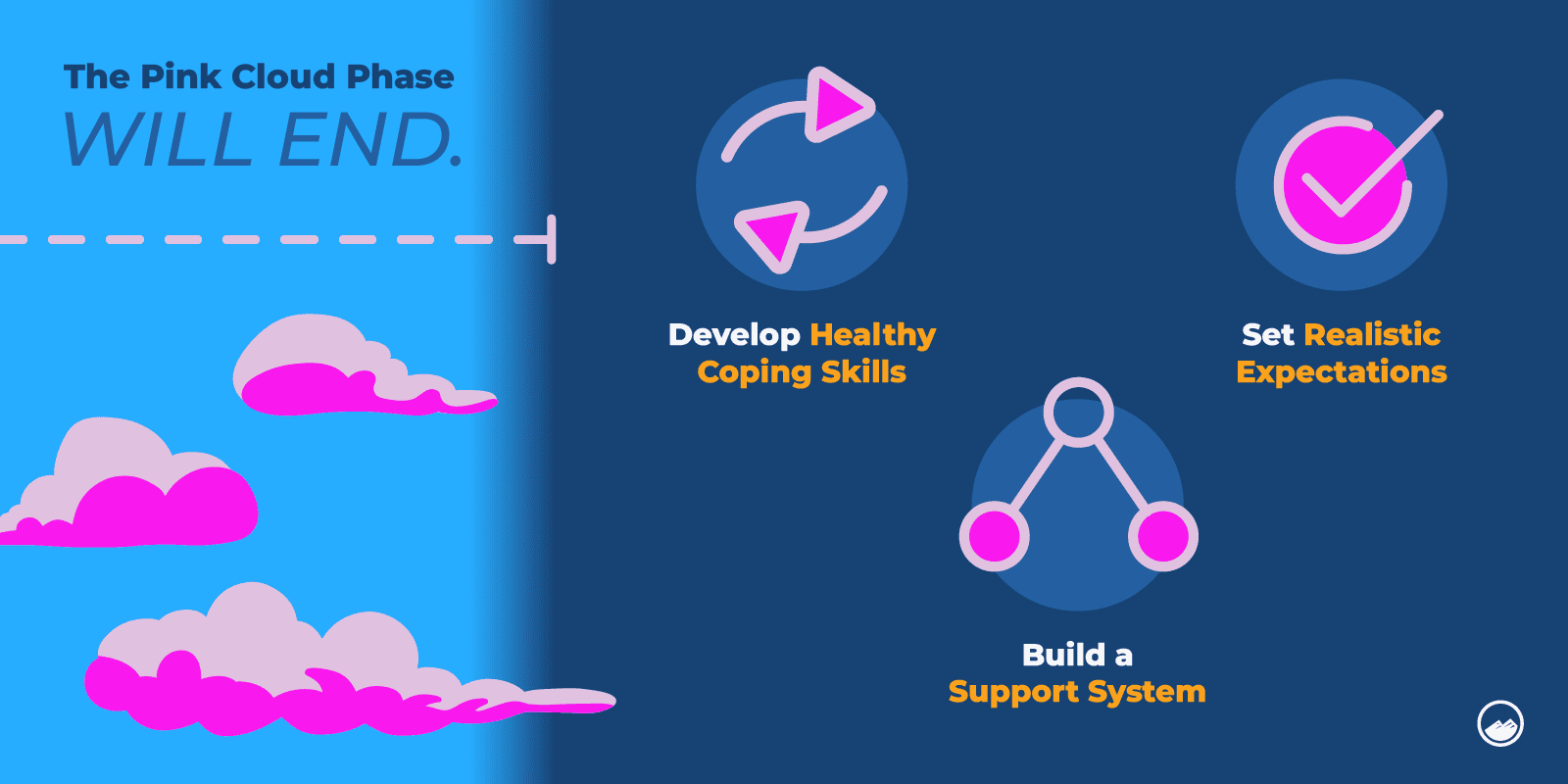
Pros and Cons of Pink Clouding
Is Pink Clouding Good or Bad?
Feeling good about recovery and finding new confidence and happiness in your life when becoming sober is a great thing.
On the other hand, pink clouding can have a negative impact on recovery in ways that can include:
- Believing you no longer need any help or treatment since you do not have an active addiction
- Becoming overconfident and putting yourself in situations that are risky to your recovery
- Ignoring daily responsibilities
- Creating unrealistic expectations
- Failing to develop healthy coping skills
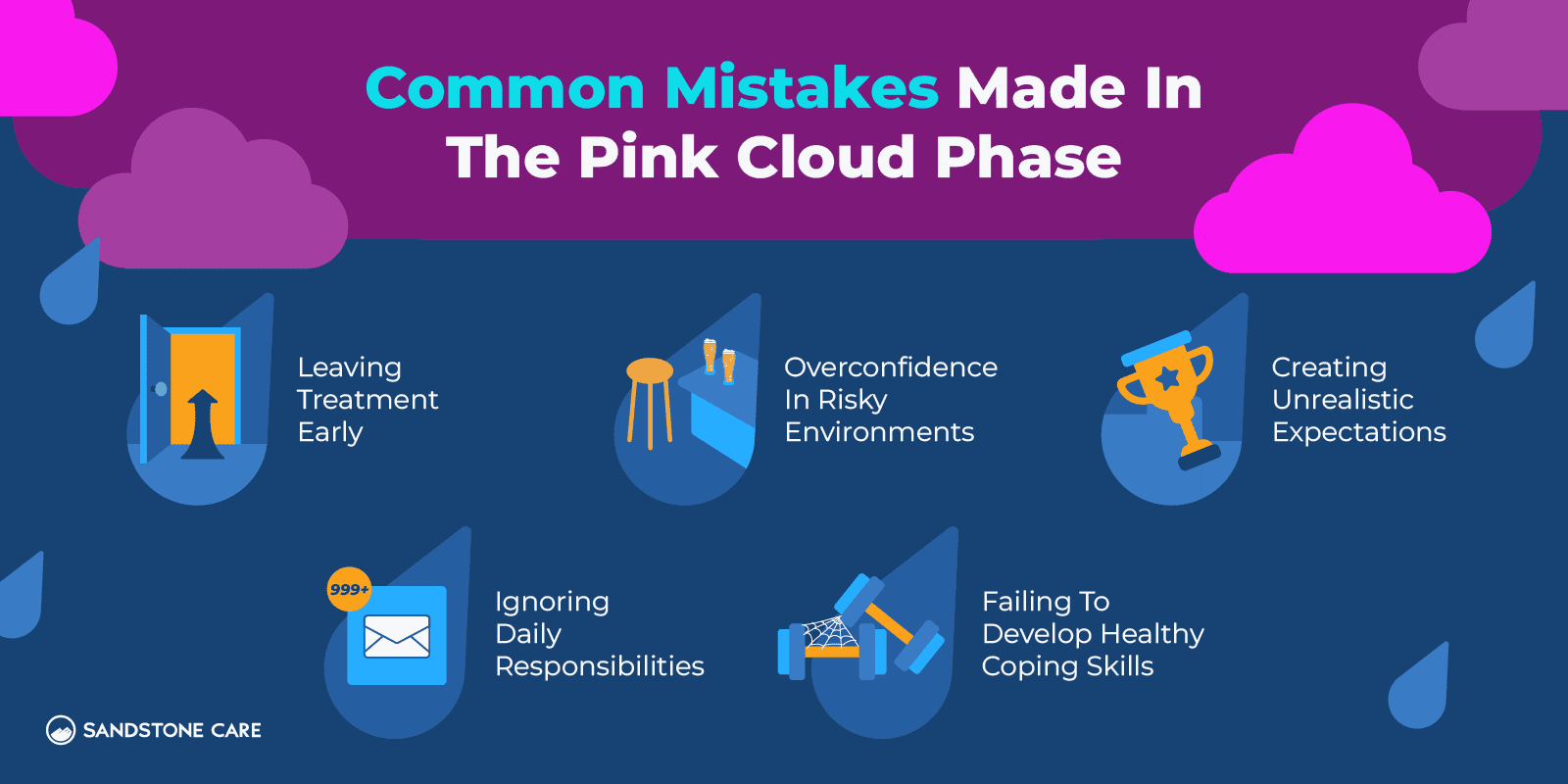
When Is Pink Clouding Beneficial?
The feelings that come with pink clouding often occur because a person can see clearer and feel better after the drugs or alcohol have left their system.
Getting help and getting started on your recovery journey is an amazing step and is something to be proud of.
Feeling optimistic and hopeful and happy that healing is starting is a great thing. When a person is looking forward to their recovery journey, it can also inspire them to change their perspectives and commit to their goals.
However, when this optimism becomes blinding, makes a person ignore reality, and encourages overconfidence, it can hurt their health and recovery journey.
Can Pink Clouding Lead To Relapse?
When the feelings of euphoria and elation wear off, it can lower a person’s mood and state of mind.
Facing challenges that they were not prepared for can create difficult feelings that may lead a person to relapse and turn to substance abuse as a way to cope.
The feelings of euphoria that are caused by pink cloud can also cause a person to become overconfident which leads them to stop participation in their inpatient or outpatient treatment program.
Even when things feel like they are going well, it is still essential to keep up with your treatment program.
Pink Clouding in Mental Health
What Is the Pink Cloud in Depression?
Similarly to the pink cloud in alcohol addiction or substance use disorder treatment, the pink cloud in depression can happen when a person is going through treatment for depression and feels good in the early healing stages.
They might think that their depression has been fixed and that there is no need to keep going to therapy or getting support because they feel happy.
However, they may soon realize that there are challenges in the reality of their recovery and healing journey and become discouraged and disappointed about their progress and their confidence in finding healing.
Pink cloud in depression can hurt a person’s healing journey because it can create a false idea of recovery and cause them to neglect important parts of their daily lives and their healing process.
If a person is in the pink cloud stage of depression, it may also make them feel that they don’t need their support system and don’t need to open up to others anymore, which can become very isolating and make a person feel alone.
What Is Pink Clouding After an Assault?
When it comes to trauma like experiencing assault or abuse, it can be very difficult to process your feelings and experiences.
When a person is recovering, they might get to a stage where they feel that everything is fine and experience feelings of happiness and an elevated mood. However, this stage comes to an end when they realize the challenges that can come after assault and the recovery journey.
What Is the Pink Cloud in a Relationship?
The term “pink cloud” can also apply to abusive relationships, especially with narcissists.
When a person is in a relationship with a narcissist, it starts just as any other relationship would.
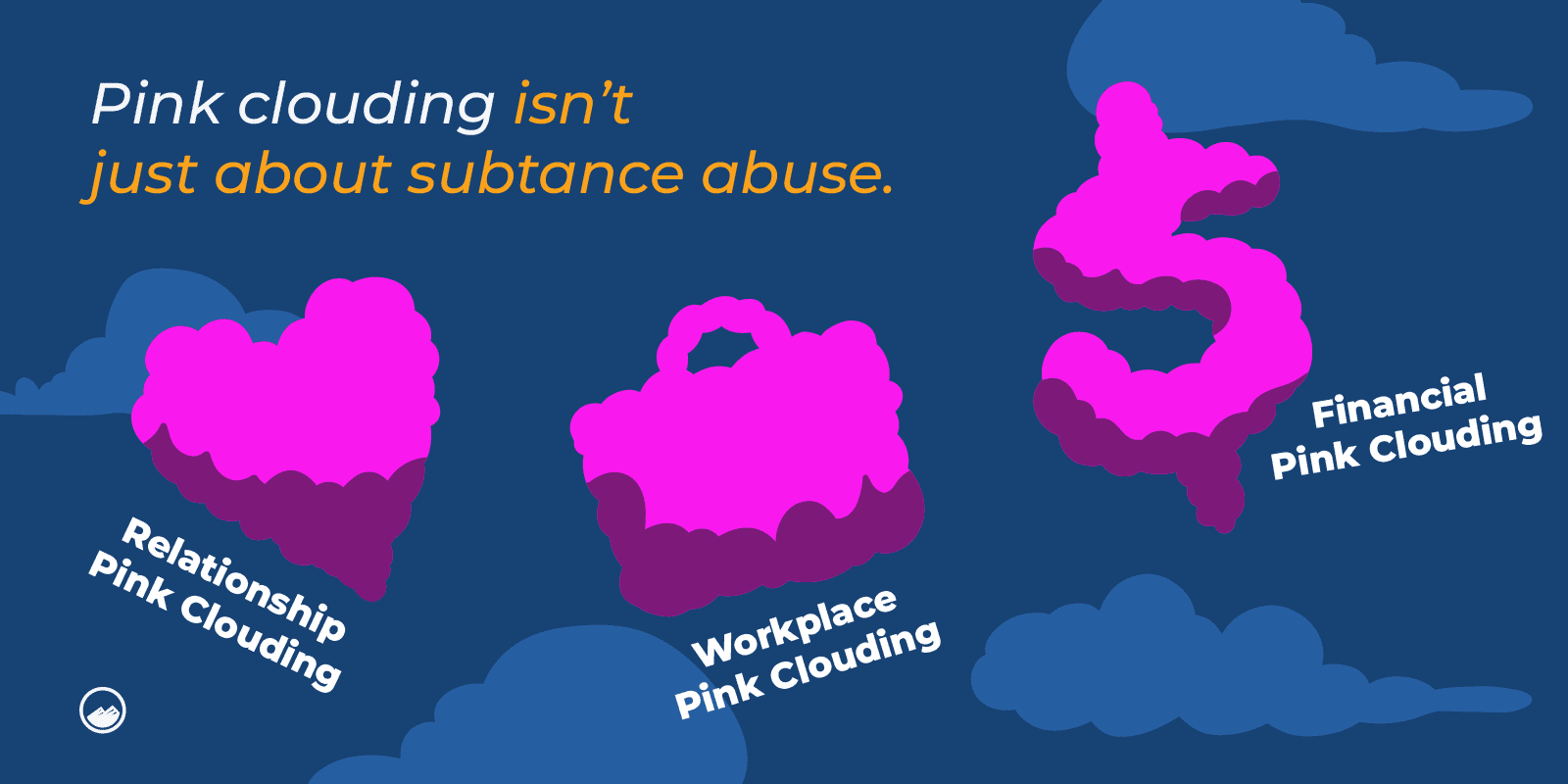
However, over time, the narcissist can become emotionally and even physically abusive. A narcissist often manipulates their partner into thinking that they do everything they do because they love them, and will do anything to convince their partner that they are wrong.
Over time, these actions feel like they are normal in the relationship and the individual may think the narcissist truly loves them and they have a hard time leaving the relationship.
Trauma bonding can occur in a relationship with a narcissist because an attachment develops from emotional or physical trauma that is followed by reinforcement.
The trauma that a person experiences in an abusive relationship can leave them feeling very confused.
The “love bombing” and reinforcement that is involved in narcissistic relationships can cause a person to feel the pleasure and “high” similar to one created by substances.
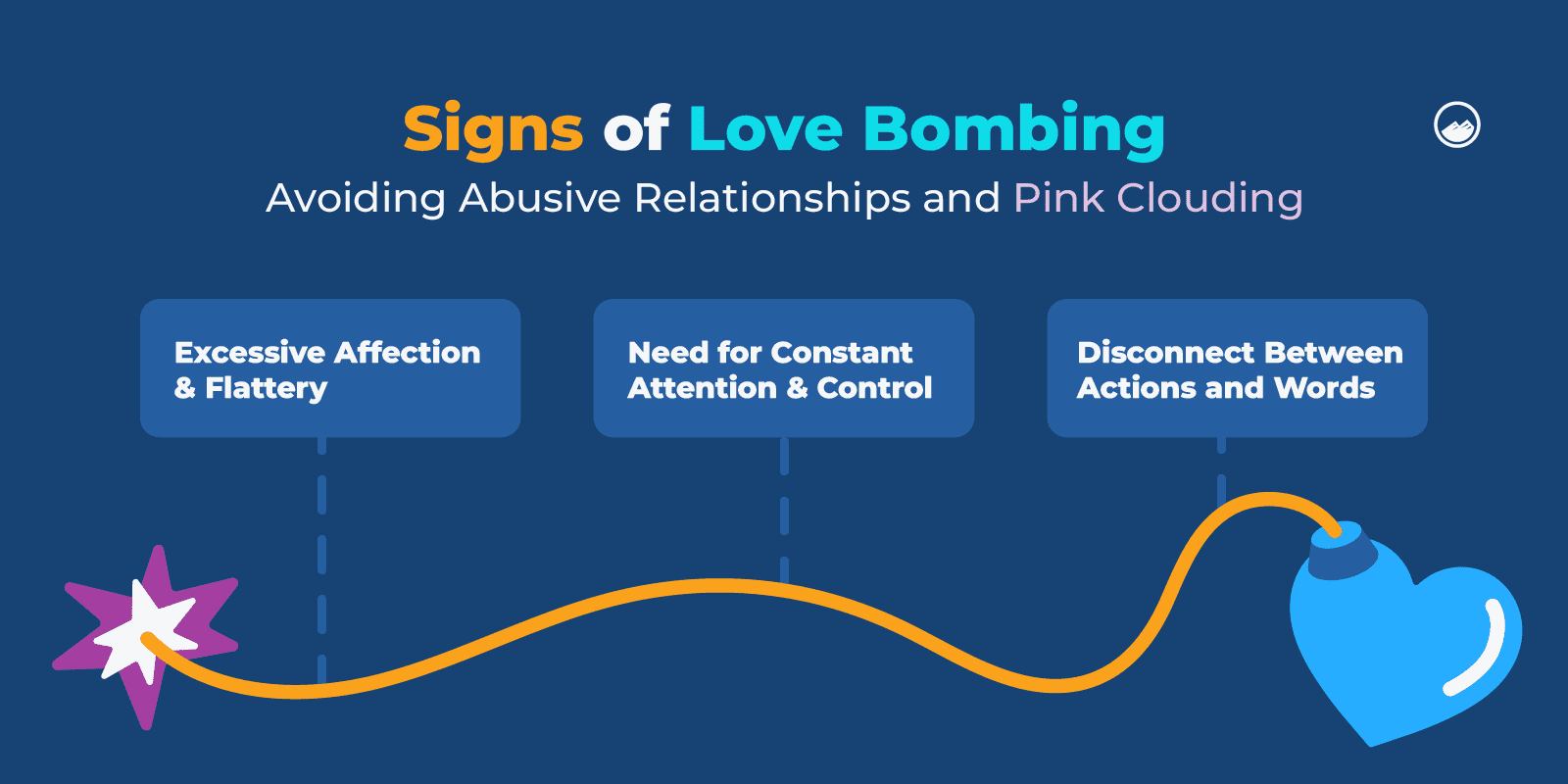
This pink cloud, or honeymoon stage of the relationship does not last forever and the person will soon recognize that this stage is not the reality of the relationship.
Pink Cloud Recovery
How Do You Get Past the Pink Cloud?
Getting past the pink cloud can be a difficult part of the recovery process, but some things that can help include:
- Talking to others and getting support
Many people in addiction treatment and recovery go through the pink cloud stage, and knowing that others have experienced similar challenges can help a person learn ways to find help and know that it is normal to go through.
- Take things one day at a time
Thinking about long-term recovery can be overwhelming and it can make certain things feel unrealistic or unattainable. Taking things one day at a time can help you focus on what is happening now, and work on taking care of yourself in the moment and healing.
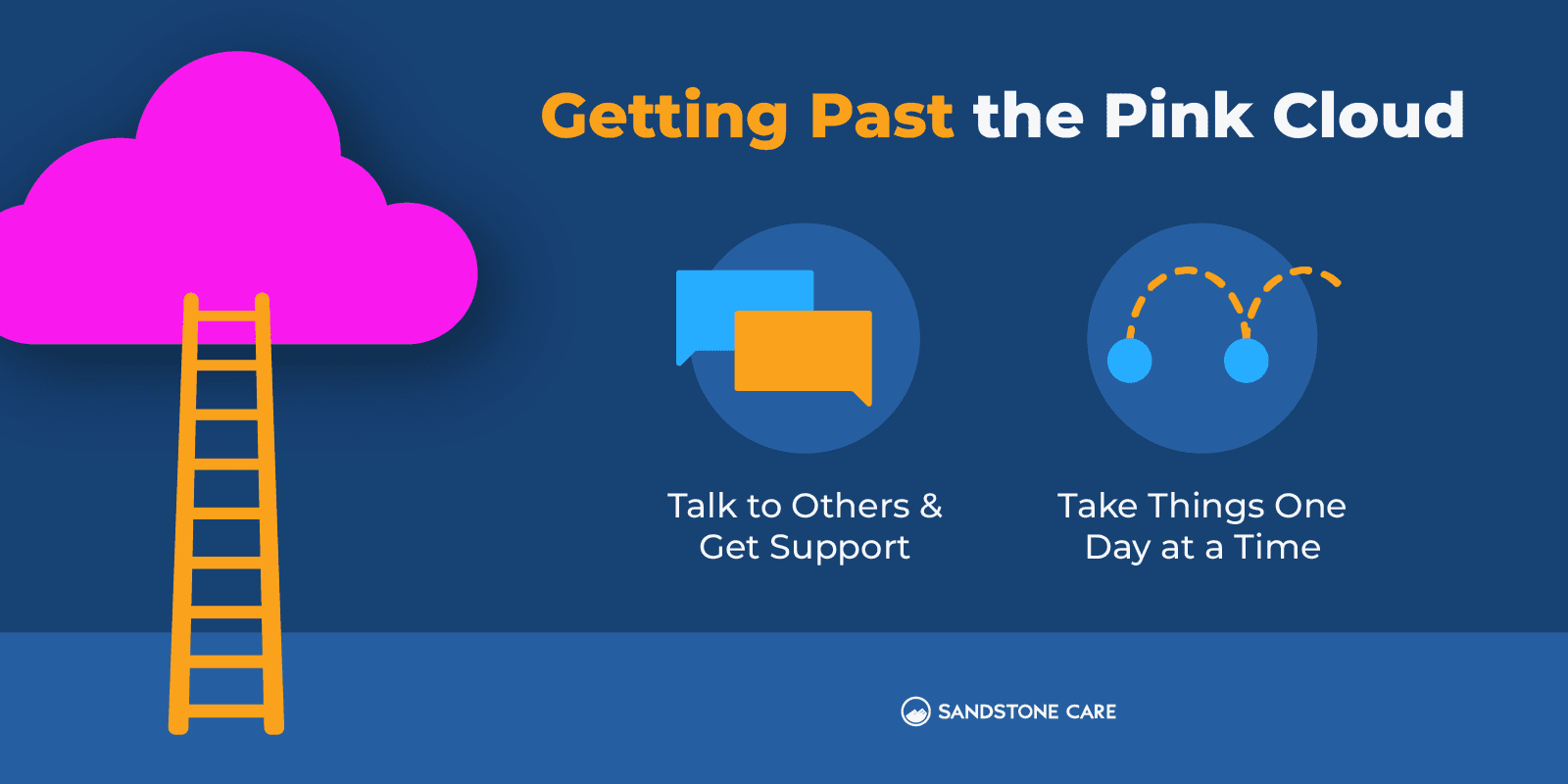
What to Do After Pink Cloud?
After the pink cloud, it can be difficult to know what steps to take and how to continue on your recovery journey.
Some things to do after the pink cloud can include:
- Reaching out for help and support
- Attending therapy and support groups
- Focus on self-care
- Give yourself grace and patience
It is also important that the feelings that come with and after pink cloud are normal and it is okay to feel this way. Talking to a loved one or healthcare professional about it can give you some peace of mind and help you figure out what steps you can take.
How Can You Prevent Relapse After The Pink Cloud?
Relapse prevention can help a person plan for the challenges that can come after the pink cloud has worn off.
Relapse prevention involves using techniques and strategies to cope with certain challenges like managing triggers or fighting cravings.
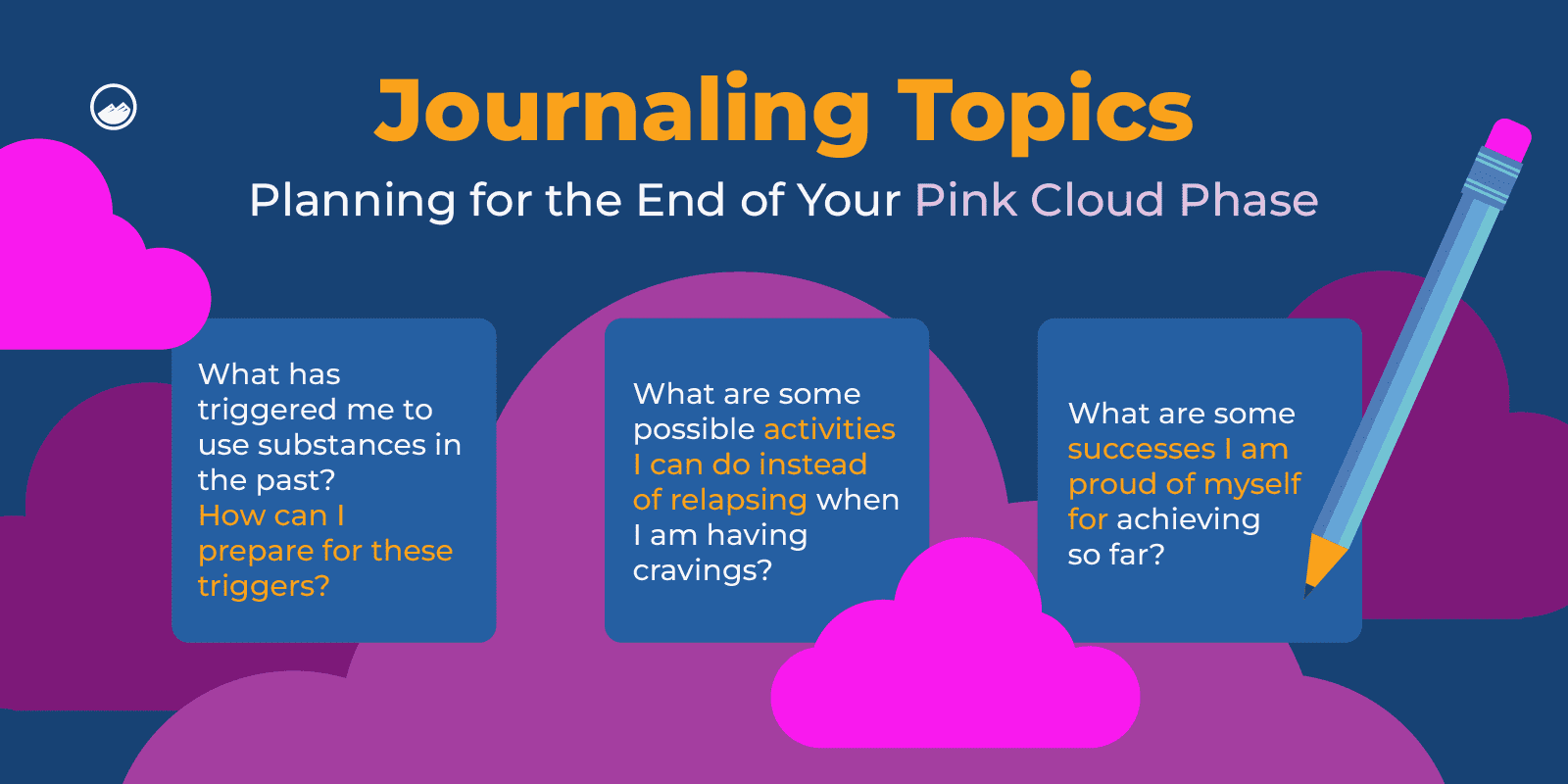
Having a strong support system is a big part of relapse prevention. Knowing you have people and a place to go when you are faced with challenges can help you work through them and feel less alone.
Support programs, such as Alcoholics Anonymous, can help a person find support through each step of recovery, whether things are going well or going bad.
Other recovery programs such as transitional or sober living programs allow you to recover in a place where you have constant access to supportive peers and professionals who can provide insights that will help you prevent relapsing.
It is important to remember that even when a person has a plan set in place, they can still experience hard times and setbacks. When this happens, it is important to take time, step back, and reach out for support.
What Types of Goals Should You Set In Addiction Recovery?
Everyone’s goals are different in addiction recovery.
Addiction recovery goals should be attainable steps that you can take to get closer to long-term sobriety and overall wellness.
Some examples of good goals to set in addiction recovery can include:
- Attending a recovery session every week, such as individual therapy, group therapy, support groups
- Practicing self-care daily
- Participating in sober activities with loved ones
FAQ
You Have Questions, We Have Answers.
Our goal is to provide the most helpful information. Please reach out to us if you have any additional questions. We are here to help in any way we can.
The idea of pink clouding in addiction recovery is similar to some responses to narcissistic abuse.
When a person is in a relationship with a narcissist, they can experience both emotional and physical abuse because of the narcissist’s desire for control and power over the other person.
At first, the relationship can start as any other one would, but over time, the narcissist can display toxic behaviors that the other person may think are normal because the narcissist convinces them they love them.
Through strategies like love bombing and gaslighting, a narcissist may manipulate a person into thinking they truly love them so that after they are abused, they still come back to them.
When the person goes back to the narcissist, they may experience pink clouding where they feel that everything is great, that the narcissist truly loves them, and that they are happy and optimistic about the relationship.
This stage always comes to an end when the person realizes the reality of the relationship and the challenges they face when they stay in the relationship.
Often, in relationships with a narcissist, one goes through a cycle of the pink cloud stage, to facing reality and wanting to leave. A narcissist will leave their partner feeling very confused about their feelings which can make it difficult to get out of the relationship.
If you are experiencing domestic abuse, reach out for help as soon as possible. You can also call the National Domestic Abuse Hotline at 800-799-7233.
Trauma is a very complex and difficult experience to process.
When it comes to trauma and pink clouding, there can be stages where a person feels optimistic about their recovery and feels like they don’t need help and can overcome their challenges alone.
However, in reality, this stage creates a false idea of the help and support they need to find healing, and can end up feeling low, alone, disappointed, and discouraged.
When a person realizes their feelings about recovery are temporary and that there is hard work needed to be done to heal and recover, it can make them question their ability to overcome their challenges.
Pink clouding is also sometimes referred to as the honeymoon period of sobriety.
In the honeymoon period, a person feels confident and optimistic about their sobriety and recovery. They experience elevated moods and feelings of exhilaration and euphoria.
While these are great feelings, the honeymoon period of sobriety can create unrealistic expectations of the recovery journey and cause a person to neglect important day-to-day responsibilities and steps they have to take in recovery.
When challenging events or difficult feelings arise, the honeymoon period of sobriety ends, and the individual can feel very discouraged or disappointed about their recovery and fall into unhelpful thoughts and habits.
The term “pink cloud” is believed to have roots in Alcoholics Anonymous and is used to describe a stage during early recovery where a person feels euphoric, optimistic, and exhilarated about recovery.
This stage can hurt individuals recovering from alcohol addiction or substance use disorder because it creates a false expectation and idea of recovery that can lead to feelings of disappointment and make it harder to overcome realistic challenges that come with recovery.
Sobriety can feel like a high in the early stages of recovery after a person has gone through the withdrawal process from drugs or alcohol.
Sobriety can feel like a natural high because when a person goes through detox, their body and brain begin to return to more balanced levels. Ridding the body of substances can make a person start feeling like themselves again.
After detox, these changes that happen in the brain and body also cause chemical changes that can lead to elevated moods and positive feelings that feel like the “high” they would get under the influence of drugs or alcohol.


Let’s Take the Next Steps Together
While the pink cloud involves feelings of euphoria and excitement about recovery, it can hurt your recovery journey. Sandstone Care is here to support teens and young adults with mental health and substance use disorders.



